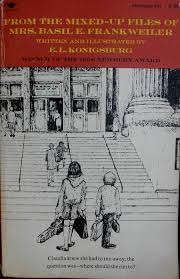Elementary school was a time of reading and rereading for me as I discovered the escapism of my favorite books. Several of my favorites tended toward children cleverly making their own way in the world – with a lot of detailed lists of the chores and tasks involved in their survivalist adventures.
1. From the Mixed-Up Files of Mrs. Basil E. Frankweiler by E. L. Konigsburg
 This was the best runaway book ever. Claudia spends the first several chapters of the book preparing extensively for her escape from her boring suburban life – saving her tiny allowance, choosing a sibling to accompany her, selecting a destination. Needless to say, I identified with this level of forethought; I was never one to just take off in anger. I also loved the idea of living in a museum, having it all to myself at night, and investigating a mysterious statue. And then, when Claudia and her brother meet Mrs. Basil E. Frankweiler? I wanted to be her too, this little old lady living in a house full of her own personal collection of artifacts with a secretive filing system that makes sense only to her. She was great! But more than that, the characters seemed to understand the escapism I was seeking in the very books I read. It wasn’t about anything specifically bad in everyday life. It was about “coming home different,” as Claudia puts it, having something to assuage the ordinariness of home life. It was about having a piece of adventure to hold onto while one quietly assumed one’s daily duties – precisely the reason I read.
This was the best runaway book ever. Claudia spends the first several chapters of the book preparing extensively for her escape from her boring suburban life – saving her tiny allowance, choosing a sibling to accompany her, selecting a destination. Needless to say, I identified with this level of forethought; I was never one to just take off in anger. I also loved the idea of living in a museum, having it all to myself at night, and investigating a mysterious statue. And then, when Claudia and her brother meet Mrs. Basil E. Frankweiler? I wanted to be her too, this little old lady living in a house full of her own personal collection of artifacts with a secretive filing system that makes sense only to her. She was great! But more than that, the characters seemed to understand the escapism I was seeking in the very books I read. It wasn’t about anything specifically bad in everyday life. It was about “coming home different,” as Claudia puts it, having something to assuage the ordinariness of home life. It was about having a piece of adventure to hold onto while one quietly assumed one’s daily duties – precisely the reason I read.
2. Julie of the Wolves by Jean Craighead George
 Like Claudia, Julie is realistic about her plans. She wants a change of life, not just to make a scene. Escaping a fairytale-esque step-family situation (in other words, not good), Julie ends up living on the Arctic tundra and befriending a pack of wolves. She lives by the same rhythms of nature as the animals she follows, from lemmings to caribou to the wolves themselves. Even though the book was full of detailed technical descriptions (e.g., Julie makes her own winter clothes out of caribou skin…after making her own needle and thread from other parts of the caribou), I pored over it as a kid. I think I liked the idea of being self-sufficient, of filling my day with simple but useful things. There wasn’t much dialogue, except between Julie and her imagined voices for the wolves, but it reassured me that I wasn’t the only one who imagined conversations in her head.
Like Claudia, Julie is realistic about her plans. She wants a change of life, not just to make a scene. Escaping a fairytale-esque step-family situation (in other words, not good), Julie ends up living on the Arctic tundra and befriending a pack of wolves. She lives by the same rhythms of nature as the animals she follows, from lemmings to caribou to the wolves themselves. Even though the book was full of detailed technical descriptions (e.g., Julie makes her own winter clothes out of caribou skin…after making her own needle and thread from other parts of the caribou), I pored over it as a kid. I think I liked the idea of being self-sufficient, of filling my day with simple but useful things. There wasn’t much dialogue, except between Julie and her imagined voices for the wolves, but it reassured me that I wasn’t the only one who imagined conversations in her head.
It was also one of my first books with a bittersweet ending; the wolves move on. So does Julie, who goes to live with her father. As much as I wished she could go with the wolves every time I reread the book, Julie’s sense of self was more important than a happy ending for the sake of happy endings.
3. My Side of the Mountain by Jean Craighead George…again. Hmm. Honestly never knew that.
 Another self-sufficient, outdoorsy runaway book, I think I mainly loved this one because of the falcon. I wasn’t planning to burn my home out of a hollow tree, or make snares, but falconry? That’s just cool. Minus the part about stealing a nestling. However, in case I ever did decide to dash off to the forests of Washington (and goodness knows there are plenty to choose from), this book would have provided a wonderful manual.
Another self-sufficient, outdoorsy runaway book, I think I mainly loved this one because of the falcon. I wasn’t planning to burn my home out of a hollow tree, or make snares, but falconry? That’s just cool. Minus the part about stealing a nestling. However, in case I ever did decide to dash off to the forests of Washington (and goodness knows there are plenty to choose from), this book would have provided a wonderful manual.
This was another unsatisfying ending, at least for me. Sam’s family shows up, agreeing that they could all “get away” from society. But I wanted Sam to live happily ever after in his solitude. It frustrated me that his family caught up with him, even if he was lonely. I liked the idea of carving out a life (literally) alone somewhere. It appealed to my introversion. So I kept rereading it, despite the ending.
4. Mandy by Julie (Andrews) Edwards
 Even before I became familiar with the flawless Queen of Everything Julie Andrews, I loved this book. I actually recommended this book to my kindergarten teacher’s daughter (she was in 4th grade at the time, so this made me very proud). Although not exactly like the other runaways on this list, Mandy also has a secret escape from her everyday life. Again, this appealed to my introverted side; I preferred my books, imagined experiences of my own or shared with Bird, to playdates or sports. Mandy climbs over the orphanage wall (what young reader doesn’t love a good orphan story?) and discovers an abandoned cottage on the neighboring estate. She begins fixing it up. She figures out how to budget for supplies, schedules her visits when she knows no one will be looking, and works until her fingers blister. Weirdly, I enjoyed the lists of her chores. It was like vicarious cleaning pleasure, and as a kindergartener I wished I could find my own little house to fix up just right. This may sound as though it goes against my feminist grain, but it was more about creating a world, a haven of one’s own (Mandy only wants something that’s hers, rather than something charity or the orphanage gives her) than just following some kind of societal norm.
Even before I became familiar with the flawless Queen of Everything Julie Andrews, I loved this book. I actually recommended this book to my kindergarten teacher’s daughter (she was in 4th grade at the time, so this made me very proud). Although not exactly like the other runaways on this list, Mandy also has a secret escape from her everyday life. Again, this appealed to my introverted side; I preferred my books, imagined experiences of my own or shared with Bird, to playdates or sports. Mandy climbs over the orphanage wall (what young reader doesn’t love a good orphan story?) and discovers an abandoned cottage on the neighboring estate. She begins fixing it up. She figures out how to budget for supplies, schedules her visits when she knows no one will be looking, and works until her fingers blister. Weirdly, I enjoyed the lists of her chores. It was like vicarious cleaning pleasure, and as a kindergartener I wished I could find my own little house to fix up just right. This may sound as though it goes against my feminist grain, but it was more about creating a world, a haven of one’s own (Mandy only wants something that’s hers, rather than something charity or the orphanage gives her) than just following some kind of societal norm.


 Obviously, this is not the healthiest emotional habit, and it doesn’t sustain Unikitty for long. Even as she explains the motto above,
Obviously, this is not the healthiest emotional habit, and it doesn’t sustain Unikitty for long. Even as she explains the motto above, 







